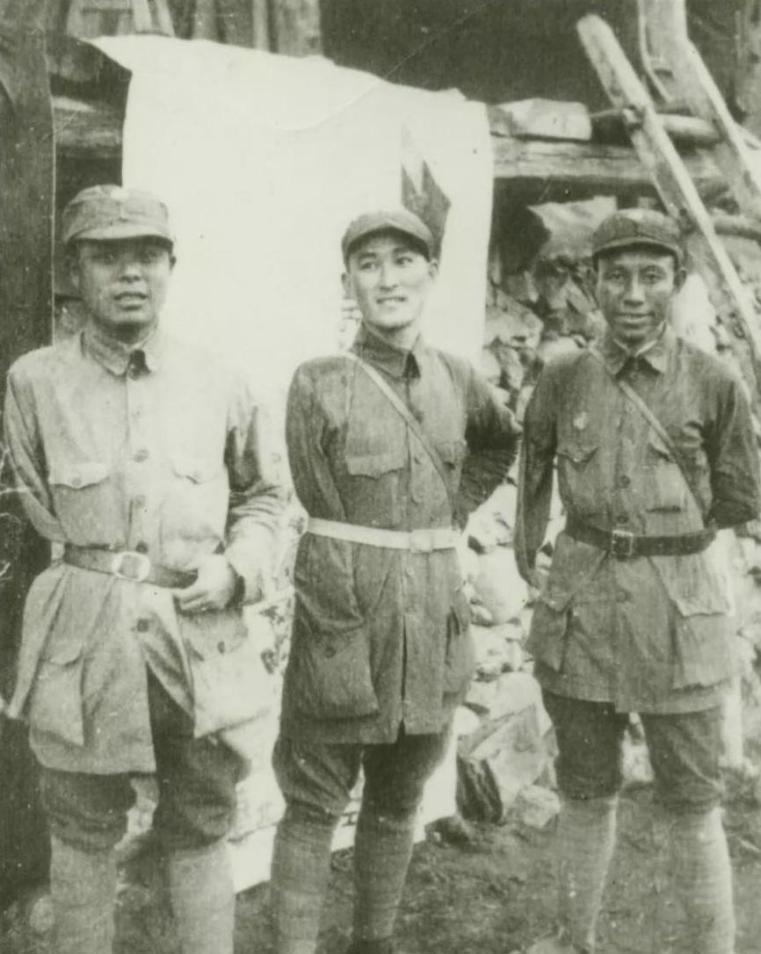
Yan Fusheng (left), Zuo Qi, Peng Qingyun (right)
In this photo, the three young men dressed in the uniforms of the Eighth Route Army, wearing armed belts around their waists, and full of energy, all of them did not have a right arm. Empty cuffs are either tucked into a belt or hang low on the right rib.
The people in the photo are Yan Fusheng, Zuo Qi, and Peng Qingyun from right to left, all of whom are regimental (battalion) commanders of the 359th Brigade of the 120th Division of the Eighth Route Army. This photograph was taken by a field reporter of the Military Region in the autumn of 1939 when the 359th Brigade of the Cha-Ji Military Region held a congratulatory meeting.
Lieutenant General Yan Fusheng
Yan Fusheng
At that time, he was the political commissar of the 717 regiment of the 359 brigade. Born in February 1904 in Liling County, Hunan Province, he joined the Anyuan Coal Miners' Movement led by Liu Shaoqi in 1923, joined the Communist Party of China in 1927, and joined the Chinese Workers' and Peasants' Red Army in 1928. During the Long March, he was promoted to political commissar of the division. From the War of Resistance Against Japanese Aggression to the founding of New China, he successively served as the political commissar of the regiment, division, and army, and the deputy political commissar and adviser of the Guangzhou Military Region. He was awarded the rank of lieutenant general in 1955 and died on 7 April 1984.
In the autumn of 1936, Yan Fusheng, then the political commissar of the 16th Division of the Red 6th Army, followed the troops in a fierce battle in Chengxian County, Gansu Province, and was shot in the right arm. Later, he was rescued by the local people and hid in a cave, surviving. Later, he underwent amputation at the Red 4 Front Field Hospital and was sent back by Wang Zhen, the political commissar of the Red 6 Army.
Major General Zuo Qi
Left Qi
Born in Yongxin County, Jiangxi in 1911, he threw himself into the revolution in 1929, joined the Communist Party of China in 1932, joined the Chinese Workers' and Peasants' Red Army in the same year, and successively served as company instructor, propaganda captain, regimental chief of staff, political commissar, director and political commissar of the political department of the division and army, deputy political commissar and adviser of the Jinan Military Region. He was awarded the rank of major general in 1955 and died on 26 August 1998.
After the Chinese Workers' and Peasants' Red Army was organized into the Eighth Route Army, Zuo Qi served as the chief of staff of the 717 regiment and followed Brigade Commander Wang Zhen to the anti-Japanese front behind enemy lines in North China. On December 17, 1938, during the Battle of Yangmingbao in Yanbei, his right arm was broken by Japanese machine guns, and Dr. Bethune performed shoulder joint dismemberment and amputation. After recovering from his injuries, he was transferred to the political commissar of the 718 Regiment.
Major General Peng Qingyun
Peng Qingyun
He was then an instructor of the 719th Regiment of the 359th Brigade, and was born in July 1918 in Yongxin County, Jiangxi. He engaged in revolutionary activities in 1930, joined the Workers' and Peasants' Red Army in 1933, and joined the Communist Party of China in 1934. He successively served as a company instructor, battalion instructor, regimental and division political commissar, deputy military political commissar, political commissar of the three departments of the General Staff, and member of the Discipline Inspection Commission of the Central Military Commission. He was awarded the rank of major general in 1955.
On October 28, 1938, the 719th Regiment, which was on the anti-Japanese front, ambushed the Japanese army in Zhangjiawan, Lingqiu County, Shanxi, and Peng Qingyun hit Lieutenant General Hiroharu Tokioka, the commander of the Japanese 2nd Brigade, with a rifle at a critical moment, but at the same time was shot through the right elbow joint by an enemy bullet, and he was seriously injured. After being admitted to the field hospital, Dr. Bethune amputated his severed arm. At that time, due to the urgent need for blood transfusions and the lack of a suitable blood source, Bethune resolutely drew his own blood and saved his life.
The one-armed general among the three senior commanders of our army is only three of the more than ten generals with broken arms of our army. However, the three belonged to the same brigade, and all of them lacked their right arms, which should be said to be unique in the history of our army.
Comrades were reunited in June 1979
In the years of the revolutionary war, the revolutionaries of the older generation were born into death and died nine times in their lives, and these three "one-armed generals" were a microcosm of the founding generals of our army, and they made immortal contributions to the cause of the independence and liberation of the Chinese nation. This is exactly:
The three veterans are indeed extraordinary, carrying guns in one hand.
Sweeping away the tiger and wolf in the world, the one-armed general is famous.